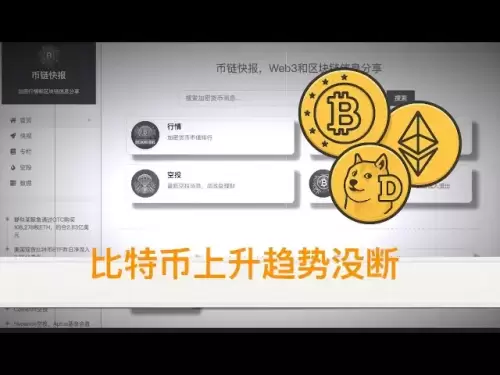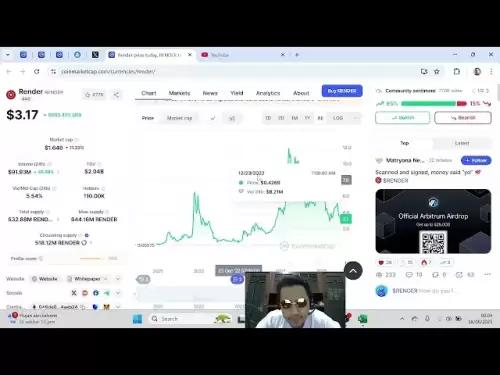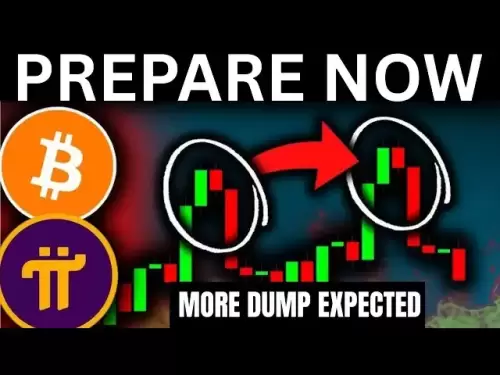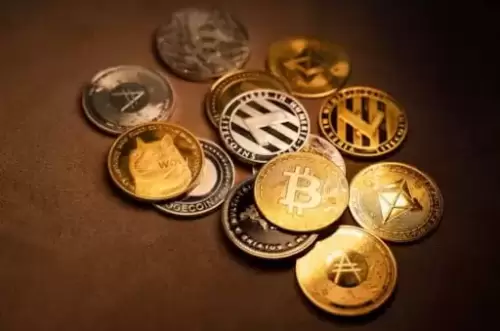 |
|
 |
|
 |
|
 |
|
 |
|
 |
|
 |
|
 |
|
 |
|
 |
|
 |
|
 |
|
 |
|
 |
|
 |
|
Cryptocurrency News Articles
BlackRock Files with the SEC to Create a New Category of Digital Ledger Technology Shares
Apr 30, 2025 at 07:41 pm

BlackRock has filed with the U.S. Securities and Exchange Commission (SEC) to create a new category of digital ledger technology (DLT) shares. These shares will be tied to the BLF Treasury Trust Fund (TTTXX), offering institutional investors enhanced ownership transparency. While the shares remain untokenized, they demonstrate a significant step toward integrating blockchain solutions into legacy asset management. The proposal also signals BlackRock’s broader readiness to leverage blockchain for improved fund management.
How do DLT shares differ from fully tokenized assets?
Instead of facilitating on-chain trading or settlement, these shares will provide a mirrored blockchain record. BlackRock plans to use this ledger system, which will be maintained by The Bank of New York Mellon. This approach signals a cautious adoption of distributed ledger technology rather than a complete asset tokenization.
Investors will still benefit from a familiar risk profile, as the fund holds over $150 million in U.S. Treasury bills. No ticker symbol or fee details have been released yet, suggesting that these initiatives remain in early development.
This initiative differs from BlackRock’s USD Institutional Digital Liquidity Fund (BUIDL), a fully tokenized offering. The DLT shares aim to enhance ownership transparency without altering traditional ledgers. BlackRock digital shares won’t replace official records but serve as a supplemental blockchain-based tool. The firm emphasized that BNY will use blockchain solely to support, rather than supplant, the primary ownership ledger.
A minimum $3 billion investment is required, indicating that the product is targeted at institutional clients rather than retail investors. By maintaining existing infrastructures, the approach minimizes operational disruptions for fund administrators.
How is blockchain changing the way institutions invest?
BlackRock digital shares reflect broader shifts within financial markets. Recently, Fidelity applied for an Ethereum-based OnChain share class tied to its $80 million Fidelity Treasury Digital Fund. This parallel move highlights stronger institutional faith in blockchain ownership.
Although awaiting regulatory approval, Fidelity’s planned May launch implies growing momentum. Institutional enthusiasm for tokenized funds underscores blockchain’s expanding role in traditional investments. As major asset managers integrate blockchain solutions, next-generation fund structures gain mainstream credibility. These developments collectively signal a significant industry pivot toward next-generation asset structures.
Graph 1, market caps of blockchain-based Treasuries, published on rwa.xyz, April 30, 2025
The change to BlackRock digital shares is a sign of the rise of blockchain in finance and the growing interest in treasury tokenization. According to Graph 1, Tokenized Treasuries now exceed $6.16 billion in market value. BlackRock’s BUIDL dominates with $2.55 billion in holdings, while Franklin Templeton’s BENJI fund follows with over $700 million managed. This growth showcases the adoption of blockchain for tangible financial instruments rather than speculative tokens. Offering greater liquidity, efficiency, and broadened market access, treasury tokenization is transforming institutional finance.
Is the future of finance revolving around tokenization?
BlackRock CEO Larry Fink has strongly championed transformations like the BlackRock digital shares move. In his annual investor letter, Fink stated that tokenization could reshape investing through instant settlements and no market closures. He noted that billions of dollars are currently stuck in slow settlement processes and could be redeployed. This capital release may enhance efficiency and spur wider economic growth. By freeing idle funds, tokenization promises more fluid markets and greater investor opportunities. Fink believes that seamless transactions could operate outside traditional settlement windows. He highlighted that tokenization will unlock new capital deployment strategies across global markets.
Fink emphasized that tokenization can democratize investing by enabling fractional ownership and digitally protecting shareholder rights across markets. This vision aligns with BlackRock’s broader efforts to expand access to financial tools through continuous innovation. The BlackRock CEO cautioned that current tokenized systems lack adequate identity verification infrastructure for truly secure transactions. Without a robust verification framework, tokenized assets will remain constrained despite their vast potential. He also warned that until these verification gaps are addressed, few people will use or want to use tokenized assets. He urged improvements to infrastructure before tokenization can achieve mainstream adoption.
Why are companies embracing digital shares?
Global financial heavyweights like JPMorgan, State Street, and Franklin Templeton are increasingly integrating blockchain technology into their operations, launching cutting-edge initiatives to tokenize traditional assets and boost fund transparency through distributed-ledger technology. These institutions are highlighting the varied benefits of blockchain, extending beyond cryptocurrencies to include compliance, rapid settlement, risk management, and investor protection. Their engagement lends credibility to a sector once viewed as fringe or speculative.
As DLT shares and related innovations gain momentum, asset management strategies are evolving toward a more transparent, efficient future. These projects transform traditional fund operations and strengthen stakeholder trust in digital ecosystems.
.
Disclaimer:info@kdj.com
The information provided is not trading advice. kdj.com does not assume any responsibility for any investments made based on the information provided in this article. Cryptocurrencies are highly volatile and it is highly recommended that you invest with caution after thorough research!
If you believe that the content used on this website infringes your copyright, please contact us immediately (info@kdj.com) and we will delete it promptly.
-

- 2025-W Uncirculated American Gold Eagle and Dr. Vera Rubin Quarter Mark New Products
- Jun 13, 2025 at 06:25 am
- The United States Mint released sales figures for its numismatic products through the week ending June 8, offering the first results for the new 2025-W $50 Uncirculated American Gold Eagle and the latest products featuring the Dr. Vera Rubin quarter.
-

-

- H100 Group AB Raises 101 Million SEK (Approximately $10.6 Million) to Bolster Bitcoin Reserves
- Jun 13, 2025 at 06:25 am
- In a significant move reflecting the growing convergence of healthcare technology and digital finance, Swedish health-tech firm H100 Group AB has raised 101 million SEK (approximately $10.6 million) to bolster its Bitcoin reserves.
-

-

-

-

-

-




























































